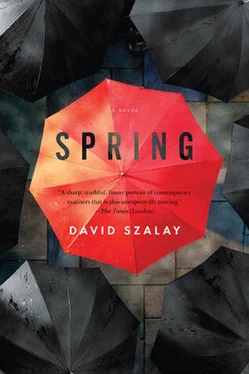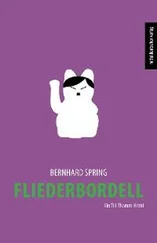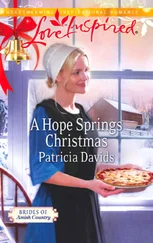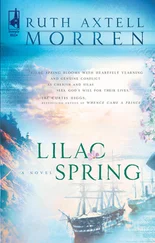He turns and Steve says, ‘Do you remember the weekend we went to Sussex or wherever, and you were looking at those houses? Like manor houses and stuff. Me and Isabel and you and your girlfriend at the time—what was her name?’
‘Thomasina.’
‘Yeah, that’s right. How much were you worth then?’
‘I don’t know,’ James says. He is embarrassed to find people staring at him. ‘Honestly.’
‘It was hundreds of millions, wasn’t it?’
‘It was nothing in the end.’
‘Yeah, but for a while it was hundreds of millions. You were in the Sunday Times Rich List, weren’t you?’
‘Was I?’ James says. ‘Maybe. I don’t know.’
Steve nods. ‘You were.’
Slowly the long table loses its hold on the party. The French windows are opened and some smokers step outside. Then other people start to wander upstairs. Eventually there are only a few left, too intensely into whatever it is they are talking about to notice that they are laggards. Finally they too stand up and leave, and the uniformed waitresses move in to finish their work, speaking Polish to each other over the silently smoking wicks.
James does not want to be the first to leave and for a while he waits outside on the oval lawn. It is a mild afternoon. Some friends of Steve’s are there, smoking what seems to be a spliff next to a small magnolia tree, its sticky-looking buds just starting to break open. Soft-focused with wine, James watches them pass the spliff from hand to hand. They make him think of people he used to see on Brick Lane…
He hears a woman’s voice shout his name.
It is Miranda, walking towards him from the French windows, tottering slightly in her heels on the soft turf of the lawn. She is, he thinks, a nice-looking woman. The white dress she is wearing honeys her skin and her smile is an orthodontist’s masterpiece. ‘James,’ she says, ‘you didn’t finish telling me about… your horse. What’s her name again?’
‘Absent Oelemberg.’
‘You said she would win this week. Where? When? I need the money!’
He says, ‘I did tell you. It’s next week, not this week. She won’t win this week. A week tomorrow,’ he says, ‘at Huntingdon.’
‘Which race?’
‘I don’t know yet. Whatever race she’s in, she should win it.’
‘A week tomorrow, Huntingdon.’
‘Yes.’
She thinks for a moment. ‘That’s the thirteenth!’
‘Yes.’
‘Is that lucky or unlucky?’
‘This isn’t about luck.’
She laughs. ‘Oh isn’t it!’
James sees Mark wander into the garden. When he sees James talking to Miranda, he stops and with his hands in his trouser pockets looks up at the sky. A minute later he is followed by Isabel. ‘Ted’s just leaving,’ she says.
James looks at his watch. ‘I should be off too.’
And Miranda immediately says, ‘Yes, me too.’
And Mark, suddenly at her shoulder, says, ‘Yeah, I have to head as well.’
*
Hugo meets him in the shadowy vestibule, wagging his tail, and they do a slow lap of Mecklenburgh Square in the quiet, sinking light, stopping frequently for Hugo to sniff and officiously micturate. James lets him precede him into the flat, and from the kitchenette hears him lapping at his water bowl. James waits in the hall—the kitchenette is too small for them to be in there at the same time—until Hugo lifts his streaming muzzle and looks unhurriedly around. His weary eyes meet James’s and he waves his tail once or twice. When he has left the kitchen, James has a draught of tepid London tap water himself.
Then he phones her.
She picks up instantly—he is practically startled—and says, ‘Hello, honey. How are you? How was your sister’s lunch?’
‘Fine,’ he says. ‘How are you? What’s up? What are you doing?’
‘Ironing.’
‘Yeah?’
He is pleased that she is ironing—it seems so safe and stable. He hears that the TV is on, and imagines her half-watching the Sunday evening telly while the warm iron vaporously sighs. They talk for twenty minutes and suddenly everything seems okay. Even more so when he asks her when he will see her and she simply says, ‘Tomorrow?’
‘Tomorrow? Okay.’
‘Okay?’
It is not until a few minutes later, when he has hung up and is feeding Hugo, that he starts to think about something that happened while they were speaking. He thought nothing of it at the time. He just heard what sounded like the front door of her flat slam shut, and Summer’s voice saying something, and then a man’s voice saying something which he didn’t make out. He thought at the time that it must be something to do with Summer.
Now it occurs to him that what he half-heard Summer say was, ‘Hi, I’m Summer.’ In other words, she was talking to someone she had never met before. He starts to think through the implications of this.
It takes him a few minutes to face up to the obvious implication — the man was visiting Katherine. If so, who was he? Katherine has a brother in London. Unfortunately, he knows for a fact that Summer has met him. A male friend then? Possibly. Though it would seem strangely intimate for a male friend to be turning up at her flat on Sunday night. The fact that she was ironing when he arrived—there would be something strangely intimate about that too. He knows of no male friends, heterosexual or otherwise, whom she would see on those sort of intimately informal terms. Most of all, if this was nothing more than an innocent visit from a friend, why did she not mention it to him? That was specifically unlike her. It was her way to end phone calls by saying what it was that was making her end them, even if it was something totally spurious. So for there to be something so obvious—that someone she was waiting for had just arrived—and for her not to mention it…
Her voice tensed up at one point. It was such a tiny thing that he was not even sure, at the time, that it had happened. First, she lost the thread of what they were saying. He had just said something, and she did not seem to hear it. There was a silence on the line. Then she said, ‘What? Sorry?’ This was immediately after he had heard the door slam, and then the voices, Summer’s voice and the wordless rumble of the man’s voice. It seemed obvious that she had been distracted. That in itself was not surprising or suspicious. They then talked for several more minutes.
It is those minutes he is thinking of now. There was something tense about her voice, as if she was talking with someone else there, someone standing there, standing over her, waiting for her to finish.
The next afternoon, Monday, he meets Freddy. James and Freddy were at school together, twenty years ago, at a famous school on the fringes of London. On Monday they meet in Earls Court—one of those streets of trucks stampeding past exhaust-fouled terraces, of youth hostels, and veiled, slummy houses full of subletting Australians, and other houses with tarnished nameplates in Arabic on the doors and the paint falling off in stiff pieces. There, under a two-star package-tour hotel, they meet. Freddy is piquey and jaundiced. In one of his down moods. His hair looks like it has slipped off his head—there is none on top, where the skin has the look of a low-quality waxwork, or the prosthetic scalp of a stage Fagin, but plenty further down, where it trails like the fringe of a filthy rug over his collar—the old collar, white-edged with age, of an otherwise blue Jermyn Street shirt stolen from his landlord.
They are meeting today to talk about the horse they part-own, and the ‘touch’ that is planned for next Monday. It is Freddy’s fault, all the horse stuff. It was he who introduced James to Michael—the tipster, the ‘pro’ James mentioned at Sunday lunch. Freddy was ‘seeing’ Michael’s sister, who was still at school at the time—this was nearly two years ago—and he quite often went to the house in Shooter’s Hill when her parents weren’t there. Sometimes, while Melissa was having a shower and Freddy was in the kitchen pilfering food from the fridge, Michael would emerge to pour himself some Coke, and Freddy would talk to him. He asked him, for instance, what he did all day. Michael was in his late twenties, still lived with his parents, and did not seem to have a job.
Читать дальше












